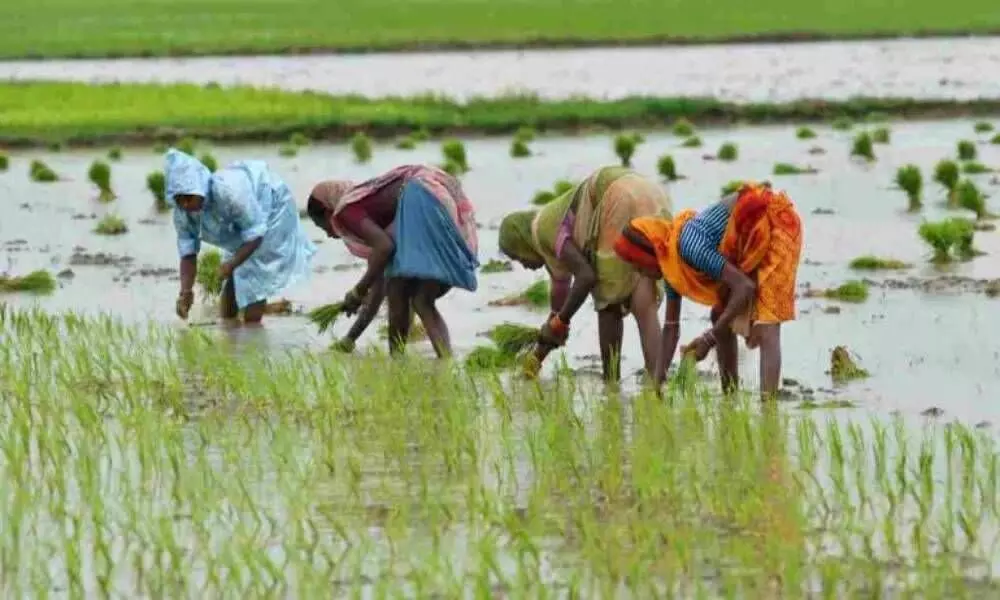Government's resolve on agriculture reforms will be tested in 2022
Though farmers’ demand for a legal guarantee of MSP has not been accepted as yet, the government has agreed to set up a panel of experts with the mandate to “ensure how all farmers can get MSP”.
image for illustrative purpose

Though farmers' demand for a legal guarantee of MSP has not been accepted as yet, the government has agreed to set up a panel of experts with the mandate to "ensure how all farmers can get MSP". The announcement to set up the committee was made by Prime Minister Narendra Modi on November 19, 2020; but the government is yet to finalise and announce the names of members of the panel. In any case, its report should be available before the end of 2022, so a decision on the issue will have to be taken in 2023, just a year before the parliamentary elections are due in April-May 2024.
The world is in the middle of a commodity price uptrend. The United Nations' Food and Agriculture Organisation Food Price Index in November 2021 was 27.3 percent higher than November 2020 after the fourth consecutive monthly rise. The prices of cereals and dairy have risen sharply. Even in the US, inflation has touched 6.8 percent, the highest since 1982. In 2021, US prices for meats, poultry and fish are predicted to increase by between 5 and 6 percent. Egg prices are predicted to increase by 3.5 to 4.5 percent while fats and oils prices may be 4 to 5 percent costlier in 2021 than a year earlier. The prices for fruits and vegetables are predicted to increase by 2.5 to 3.5 percent. So food inflation may well be a global phenomenon in 2022.
Due to a fall in global and domestic prices of agricultural commodities in 2016 -19, many observers felt that India has finally become a permanent surplus nation in agricultural production. This year, however, such surpluses have not been seen. In fact the rise in domestic prices of several items in 2020 and 2021 forced the government to invoke the Essential Commodities Act to impose stock limits on pulses and edible oils and ban the export of onion. Even the import of genetically modified (GM) soymeal was permitted for the first time to keep poultry prices under check.
Despite the recent fall in the price of cotton due to uncertainties caused by the global spread of the Omicron variant of the COVID-19 virus, domestic cotton prices are about 40 percent higher than last year. So while the textile industry would like the government to intervene to bring down the prices, 2022 will also test the government's resolve to free up agricultural trade.
It can be argued that the farmers' agitation and the stay granted by the Supreme Court against the farm laws provided an opportunity to the government to ignore its own Essential Commodities (Amendment) Act, 2020, and impose stock limits. There is no doubt that the EC Act discourages investment in storage and supply chain infrastructure and sudden restrictions on stocking and movement cause uncertainty and ultimately have an adverse impact on farm gate prices. Hence a more agile but predictable import-export regime has to be put in place that can manage domestic prices through imports (when domestic supply is constrained) while ensuring that the landed price of such items is not below the MSP.
Since the government has committed to the status quo ante on procurement, we can expect rice procurement of about 50 million tonnes and wheat procurement of about 40 million tonnes. This is much more than the requirement of the public distribution system. Due to the pandemic in 2020-21 and 2021-22, surplus food grains were used well for an additional allocation of 5 kg per person per month. If the pandemic is brought under control, this option will not be available to the government. Export of food grains procured under MSP operations may come under question in spite of the peace clause agreed at the World Trade Organisation negotiations at Bali in December 2013.
So managing the excessive food grain stocks will be a challenge for the government in 2022. One only hopes that the surplus food grains will not be given at subsidised prices for the manufacture of ethanol. In a country where half the population is earning only Rs 4,467 per month, this will be a real tragedy.
One hopes 2022 will be a year of reconciliation between the farmers and the government.

